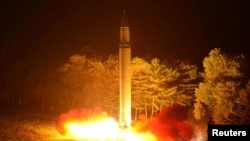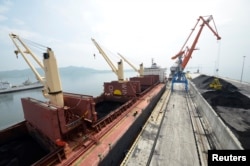The United States is seeking the quick adoption of a U.N. Security Council draft resolution on Saturday that would deprive North Korea of $1 billion a year in revenue that helps fuel its illicit nuclear and ballistic missile program.
The move for additional sanctions is in response to Pyongyang’s intercontinental ballistic missile launches July 3 and 28, which showed that the rogue nation may now have the capacity to bring the U.S. mainland and much of Europe into its crosshairs.
Diplomats say that after weeks of negotiations between the United States and China, the Security Council has scheduled a vote for 3 p.m. (1900 UTC) Saturday, as all 15 members have seen and discussed the U.S.-drafted text.
According to a Security Council diplomat with knowledge of the negotiations, the provisions, if adopted and implemented, would effectively deny Pyongyang of a third of its annual $3 billion in exports. Four export sectors are targeted in the resolution: coal; iron and iron ore; lead and lead ore; and seafood.
In two council resolutions adopted in March and November of last year, the council imposed export caps on coal, which is North Korea’s single largest export.
“In this resolution, there is no cap, there is no allowable coal, all coal exports will stop, will be banned from export from North Korea,” the council diplomat said.
Immediate $400M drop
By removing that cap, the diplomat said there would immediately be a decrease of $400 million a year in North Korea’s export revenue.
Iron and iron ore would also be included under the full ban, depriving North Korea of an estimated $251 million this year. There would be prohibitions on lead and lead ore exports as well, which were expected to generate about $113 million in revenue this year and on seafood, which was anticipated to bring in nearly $300 million in 2017.
The diplomat said the draft resolution would also prohibit countries from accepting additional guest workers from North Korea. Pyongyang is notorious for sending its citizens to other countries to work and then confiscating much or all of their salaries, effectively making them slave labor.
The draft text also tightens the enforcement of existing sanctions. The council has imposed several rounds of increasingly tougher targeted sanctions on North Korea since 2006 for its nuclear tests and ballistic missile launches.
The proposed resolution also designates nine North Korean individuals and four entities for asset freezes and travel bans.





